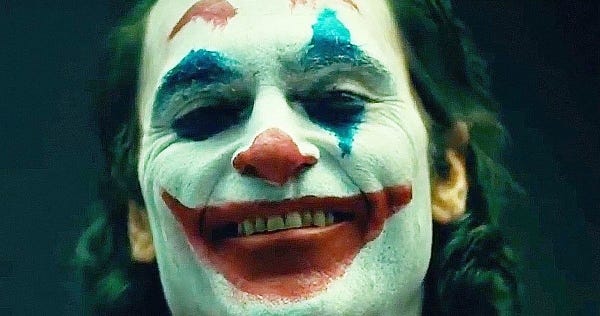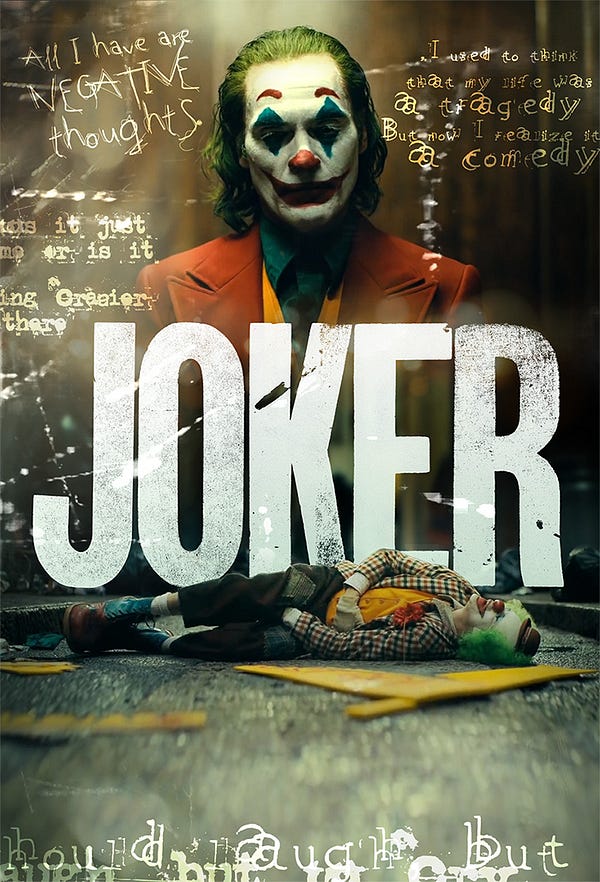J-O-K-E-R: Joaquin’s ‘Mental’ Moxie
https://www.youtube.com/MoxieTalk?sub_confirmation=1
https://medium.com/moxietalk-with-kirt-jacobs/j-o-k-e-r-joaquins-mental-moxie-c3c32ca1d234
He plays a comic book clown, and it’s not for laughs.

Joaquin Phoenix was recently nominated for (yet another) Academy Award, this time for his performance as Arthur Fleck in The Joker. Phoenix’s Fleck was rich with layers of detail, complex and nuanced. Phoenix has a penchant for playing dark characters, and I doubt we’ll ever see him grace the silver screen as the leading man in a frothy rom-com.
It takes moxie to bring complicated characters to life, and Phoenix has it.
Here’s how:
Moxie rises from the ashes.
Phoenix had what he himself described as an “unconventional upbringing.” He was born Joaquin Bottom in Puerto Rico and spent his upbringing traveling through Central America with his bohemian parents and siblings as part of a cult. When his parents became disillusioned with the cult, they settled in Los Angeles and changed their name to Phoenix, a symbol that they were rising from the ashes of their old life. Joaquin chose to be called Leaf Phoenix and joined siblings River, Summer, and Liberty in supporting the family by acting and performing.
“I had a really wonderful upbringing. We were a tight family. It was wonderful to grow up with so many siblings. We were all just a year or two apart, and we were always so supportive of each other. I learned everything from my older brother and sister and taught it to my younger sisters.”
Young Leaf found some early success, but it was his older brother River who became a star. If you grew up in the 80s as I did, you knew River. Leaf was the kid brother of the star of Stand by Me, and he seemed content in his shadow. It was a shadow that everyone thought would stretch over Hollywood for years to come.
That all ended with River’s untimely death of an overdose at the tender age of 23. Leaf was cast into the harsh and unrelenting spotlight. The 911 call he made trying desperately to get help for his brother — surely the most vulnerable moment of his life to that point — was exposed for all the world to see and hear.
Joaquin and his family retreated from the spotlight to grieve and heal. It took several years before he began making movies again.
This became a pattern for Joaquin — make several movies back to back, then retreat and regroup for a bit. How appropriate that he bears the name of a mythical bird that burns white-hot for a time, then rises from its own ashes, renewed.
It’s wise to recognize the need to retreat, rest and restore. Phoenix began the practice of self-care before it was a buzz word. He didn’t let the fear that he would be forgotten or wouldn’t get the roles he wanted to push him into sacrificing his well-being. Instead, he made himself a priority. That takes moxie.
There’s a method to the moxie.
It’s tempting to think that Phoenix’s string of dark, brooding characters is some effort to work through his own angst, but by his own admission, it’s not. His characters are nothing like himself. He is exploring entirely new people he is creating in collaboration with others.
He spends months in advance talking with his director, making every effort to understand and construct the people he is creating. When it’s time to shoot, he steadfastly avoids read-throughs and rehearsals with other cast members. He prefers to continue the collaboration while filming on set, taking several takes to capture exactly what he and the director are trying to achieve.
The result is an authenticity that shows up on the screen.
Phoenix’s approach is different from others — Sir Anthony Hopkins comes to mind — and that’s ok. Phoenix has found and developed what works for him, and the results speak for themselves.
Moxie embraces anxiety.

It seems as if you might have a hard time convincing Phoenix that his method is working, however. He’s driven by anxiety.
“The reason I keep making movies is I hate the last thing I did. I’m trying to rectify my wrongs,” he once said.
For a couple of weeks, before he begins shooting, he’s often anxious to the point of vomiting. Onset he might appear to be all business, but underneath his costumes, he’s sweating profusely. He often creeps off to a corner somewhere to chain-smoke and brood.
His anxiety is driven by fear that he won’t be able to deliver the performance he’s envisioned with the director. He’s afraid he’ll let down the people who have trusted him. He’s afraid his performance will fail the character he’s created, and will not live up to his own expectations.
It takes moxie to face down that kind of anxiety, and tackle a demanding job despite your own personal discomfort, and Phoenix has it.
I think a lot about the people I’d like to interview, and what it might be like, but I have to admit, I feel a little uncomfortable at the thought of interviewing Phoenix. His discomfort in interviews and other public appearances is so palpable. Sitting next to him and asking him questions would be a form of torture for him, and I just don’t think I could do it.
But I would enjoy a real conversation with him, one without lights and cameras and questions. I get the sense that his thoughts and ideas are too complex to be contained in one conversation. We’d need time to meander and explore and explain. And probably, in the end, we would still not have the complete picture. But it would certainly be a fascinating journey.
Joaquin Phoenix’s Wikipedia Page: https://en.wikipedia.org/wiki/Joaquin_Phoenix





































